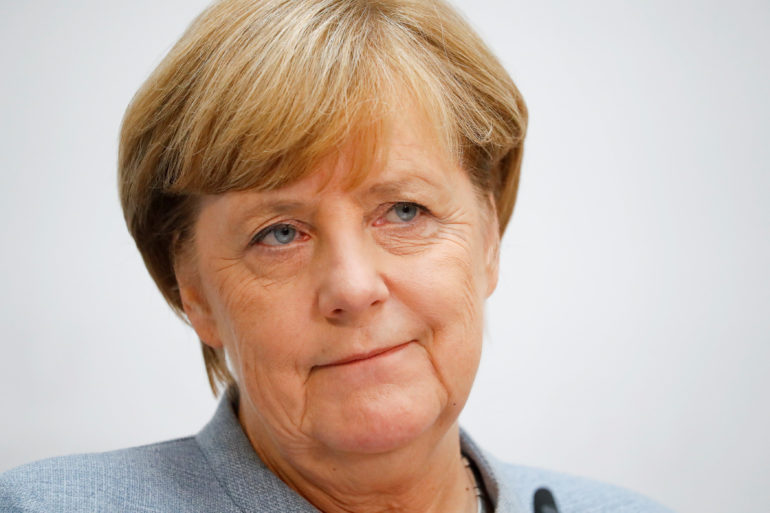
Christian Democratic Union CDU party leader and German Chancellor Angela Merkel addresses a news conference at the CDU party headquarters, a day after the general election (Bundestagswahl) in Berlin, Germany September 25, 2017. REUTERS/Kai Pfaffenbach
Brett McGarry
German Chancellor Angela Merkel has a difficult task ahead of her as she must form a new coalition government after being reelected for a fourth term. Merkel has come out on top but this is likely not the result Merkel’s Conservatives were hoping for.
Far from being a landslide, the CDU party saw their worst election results under Merkel’s leadership, losing around 10 per cent compared to the last election.
Merkel addressed her party by admitting the difficulties of the past four years but reminding them that “the CDU and the CSU are the strongest party.”
“We have the job of building a government and no government can be built against us,” Merkel said in her address.
In Germany, governments are formed through a coalition of elected parties that must make up 51 per cent of seats in parliament. After the last German federal election in 2013, Merkel’s CDU joined the center-left SPD party for a grand coalition – when the two largest opposing political parties unite.
This year has seen a shift as the SPD and their leader Martin Schulz declared they will not be joining the coalition again and will actually move to stand in opposition of Merkel. Should Schultz stand by this, Merkel would most likely form a government with the Greens party and the Free Democrat Party which has been dubbed the “Jamaica” coalition due to the combination of the three parties’ colours matching the Jamaican flag.
#Merkel makes second appearance at #CDU party HQ. Warns of “tough weeks ahead” as she tries to form a governing coalition. #GermanElection pic.twitter.com/lqR8hfu4jl
— Michaela Kuefner (@MKuefner) September 24, 2017
AfD enters parliament
The largest surprise of this year’s election is the far right populist party Alternative for Germany (AfD) entering parliament with a staggering 12.6 per cent of the vote, granting them 94 seats. They are now the third-largest party in Germany, which has not seen a far-right party in parliament for several decades.
After the results of the exit polls became public, hundreds of people gathered outside AfD headquarters in Berlin to oppose their anti-immigration and anti-Muslim policies.
Merkel spoke directly about the upcoming “challenging legislative period”, pledging to regain votes from the AfD through analysis and good policy.
Merkel wants to “win back” AfD voters by “solving their problems and listening to their concerns” https://t.co/QKJDW028Rk #GermanyDecides pic.twitter.com/YDCGFDyWNU
— dwnews (@dwnews) September 24, 2017
This year’s less than ideal results for Merkel may be a reflection of her government’s controversial stance on refugees, which saw over one million migrants enter Germany in 2015.
“Germany has always been compassionate regarding immigration but Merkel’s stance may be too overwhelming for not only the people but also the government,” Juegen Belle, President of the German Canadian Club in London, said.
“Merkel may need to tone down her position on immigration in the face of new opposition. It’s one of the larger issues in German politics.”
Why are some surprised at the AfD’s success? Let in 1 million immigrants and there will be political consequences, as night follows day.
— Christopher Meyer (@SirSocks) September 25, 2017
Divisions in the AfD
There is already trouble for the AfD. During a press conference directly following the election results, co-leader Frauke Petry announced that she would not sit with the party in parliament.
According to Associate Professor at York University’s department of political science Heather MacRae, the AfD entering parliament is neither a surprise nor cause for concern.
“We saw all along in polls that the AfD would get around 12 per cent. The AfD is already coming apart at the seams and factions are being formed. This is not a united front. The coalition government will still be making all decisions in regards to immigration and policy,” MacRae said.
Far-right politics and populism has been on the rise in continental Europe and the USA along with the rhetoric.
“We saw this in Dutch elections, French elections, USA elections, we saw it in the UK and now the German elections. In every single election we saw the far-right being neutralized,” MacRae said.
“Yesterday’s election showed the strength of Germany’s democracy. It is able to absorb a party like this and not come undone. The AfD will not be the tail wagging the dog.”

